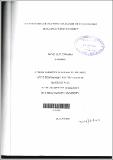The impact of bi-vocational ministry on church health: a comparative study of the Church of the Nazarene, Kenya Central District and the Anglican Church of Kenya, Nairobi Diocese

View/
Date
2023-07Author
Onyango, Charles Oduor
Type
ThesisLanguage
enMetadata
Show full item recordAbstract
Church health is widely confused with church growth. Whereas church growth is the
numerical increase of attendance in churches with elements of spiritual growth, church
health is the wholeness, that relates to interpersonal relationships, and not only focusing on
growth but on the greater mission of God. The aim of this research was to examine the
impact of bi-vocational ministry on church health involving a comparative study of the
Church of the Nazarene (CotN), Kenya Central District (KCD), and that of the Anglican
Church of Kenya (ACK), Nairobi Diocese. The study objectives were: first, to contrast and
compare the bi-vocational and full-time pastor’s work schedule’s impact on church health;
second, to determine how the bi-vocational pastor’s church economy impacts church
health; third, to assess how the bi-vocational pastor’s leadership expectations impact
church health; and finally, to establish interventions that can help the bi-vocational pastors
to deal with church health challenges and at the same time maximize on the positive
impacts. The research comprised both primary and secondary data collection techniques
through field surveys that incorporated both quantitative and qualitative study methods.
The research purposefully sampled churches within the CotN where bi-vocational pastors
minister and compared them with parishes in the ACK that have full-time priests. Lead
pastors from both the churches were interviewed one-on-one, by the use of an interview
guide, on the impact of the nature of their ministries on church health of their local
churches. Also questionnaires were distributed to the other pastors (associates and
attached). The researcher assumed a uniform distribution of respondents within the target
population which was 500 with a sample size of 217 and therefore, used a non-probability
sampling frame. The Cronbach alpha (α) reliability test and validity of the study
instruments were authenticated through a pilot test that was scrutinized by the research
supervisors. Statistical Package for the Social Science (SPSS), version 26 was employed
in the exercise of analyzing and presenting the final quantitative data. This involved the
use of statistical presentations such as tables, pie charts, graphs, frequencies and percentage
calculations and inferential statistic. The qualitative was thematically analyzed and
presented in narratives. The study made recommendations on strategies that can be used to
improve church health in the local churches. The study established in relation to the
pastors’ working time that their time-frames fully engaged in the ministry work enhances
ministry service. The study established that pastors’ effectiveness depends on the church’s
economic stability. The assessment carried out revealed that the expectations of pastors are
the same for both full-time and bi-vocational ministries. The study concluded that pastors
whether in full-time or bi-vocational ministry need to develop viable strategies for
improving church health. Therefore, the study recommends the following: pastors need to
intrinsically search their hearts on whether God, the owner of the church has called them
to His ministry and hence meet the needs of His flock; pastors and church leaders need to
to develop creative ways of supporting both the pastor as well as the members without
regular income; bi-vocational pastors should not consider themselves lesser in ministry
than full-time, both are called by God; church leadership should look for ministry partners
to work with; and finally, the researcher recommends that in future a similar study be
carried out in the indigenous churches, like the AIPCA – Tri-Bar Cross, the Legio Maria
or the Africa Divine Church to find out how their churches realize church health.
Publisher
Africa Nazarene University
Subject
Bi-vocational ministryChurch health
Church of the Nazarene, Kenya Central District
The Anglican Church of Kenya, Nairobi Diocese
Collections
Related items
Showing items related by title, author, creator and subject.
-
The effectiveness of pastoral counselling in the management of HIV/AIDS in the church in Malawi: a case of the church of the Nazarene, Malawi Central District
Manjengwa, Farai (Africa Nazarene University, 2019-08)This study was conducted within the Church of the Nazarene, Malawi Central District. The study sought to investigate the effectiveness of pastoral counselling in the management of HIV/AIDS in the church. The objectives of ... -
An Evaluation of Churches’ and Church-Based organizations’ roles in enhancing food security in Turkana District
Amach, Daniel Juma (Africa Nazarene University, 2009)This study was carried out in Turkana district where people have been dependent of food handouts for many years. The district leads in the number of churches and church-based organizations working on various programs to ... -
Factors affecting youth participation in Church Programmes within the Presbyterian Church of East Africa, Kajiado Presbytery, Kajiado County, Kenya
Njoroge, Stephen Ng'ang'a (Africa Nazarene University, 2015-07)Youth failing to participate in the Church programmes though they attend church in large numbers has been a major concern in the Presbyterian Church of East Africa (PCEA) Kajiado Presbytery. As a result, most of church ...



